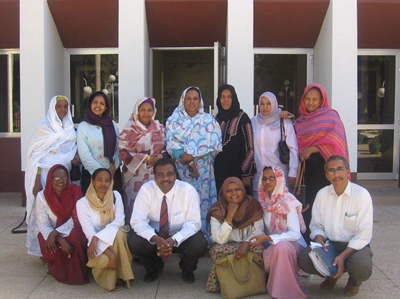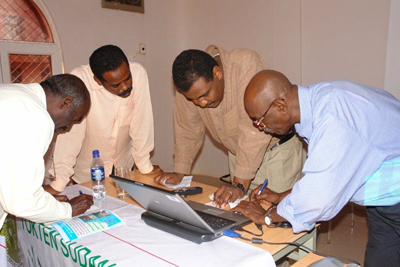Posted 9:36 p.m. Friday, Jan. 20, 2012

 [/caption]
In Sudan young people are driven to earn a college degree and embark on successful careers, but the country’s lack of 21st century technology makes that goal nearly impossible.
Mohamed Elhindi, UW-L’s assistant vice chancellor and chief information officer, is familiar with the challenges in higher education in Sudan. He has volunteered as an international adviser with a United Nations development program in the country since 2006.
He recalls meeting a young woman at a university library his first year volunteering in the country. She was working on her master’s thesis, but couldn’t find the information she needed. When Elhindi asked to see what she had so far, she opened her notebooks to display pages and pages she had copied by hand — amounting to five entire textbooks. She couldn’t check out any library books because of the school’s limited resources and she lived eight hours away. Concepts like searching Google or library databases didn’t exist. Even some of the books students used
[caption id="attachment_8962" align="alignright" width="400" caption="Mohamed Elhindi, UW-L chief information officer, does a technology demonstration for a group of deans from colleges in Sudan."]
[/caption]
In Sudan young people are driven to earn a college degree and embark on successful careers, but the country’s lack of 21st century technology makes that goal nearly impossible.
Mohamed Elhindi, UW-L’s assistant vice chancellor and chief information officer, is familiar with the challenges in higher education in Sudan. He has volunteered as an international adviser with a United Nations development program in the country since 2006.
He recalls meeting a young woman at a university library his first year volunteering in the country. She was working on her master’s thesis, but couldn’t find the information she needed. When Elhindi asked to see what she had so far, she opened her notebooks to display pages and pages she had copied by hand — amounting to five entire textbooks. She couldn’t check out any library books because of the school’s limited resources and she lived eight hours away. Concepts like searching Google or library databases didn’t exist. Even some of the books students used
[caption id="attachment_8962" align="alignright" width="400" caption="Mohamed Elhindi, UW-L chief information officer, does a technology demonstration for a group of deans from colleges in Sudan."] [/caption]
as references dated back to the early 1900s and the information was obsolete.
Elhindi worked with a UN team to build an e-library system at several university libraries in Sudan that year so students were able to access library materials online. The trip was coordinated through the UN Program TOKTEN: Transfer of Knowledge Through Expatriate Nationals. Through the program, expatriate nationals who have migrated to other countries and become successful return to their countries of origin to volunteer with the goal of reducing the adverse effects of “brain drain.”
Every year since 2006, Elhindi has returned once a year during winter break to teach the Sudanese about concepts such as how to incorporate technology into government processes, secure e-banking, develop curriculum, assess student learning, and build capacity and sustainability in health education.
For two weeks this January, Elhindi was in Sudan bridging the “digital divide” between higher education and careers. The country has 80,000 college graduates a year with only 60 percent finding a job. He helped schools better understand the needs of the market and incorporate technology into teaching and learning so students would be better equipped to meet workforce needs.
Like the many Sudanese who don't find work, Elhindi didn’t find much opportunity to stay in Sudan either. That's why in 1989 he left the country at age 19. Sudan had only three universities at the time, so only a small fraction of students who performed the best on a national test could go on to college. Elhindi left the country to earn his degrees in the U.S. He studied computer science at Winona State University and went on to earn a master’s degree at St. Mary’s University in Winona and a doctorate degree from NOVA Southeastern University in Florida. Although Sudan’s government gave him little opportunity for education, he notes the people of Sudan did teach him a lot about life.They instilled in him such qualities as being happy with what you have and taking education seriously — a prime example being the young woman in the library for days on end copying books.
“I’m giving back to the people who helped me to be the person I am today,” says Elhindi. “The goal is building capacity and sustainability to make sure their knowledge and skills are elevated so they can become part of this global economy.”
More on TOKTEN: www.toktenlebanon.org
[/caption]
as references dated back to the early 1900s and the information was obsolete.
Elhindi worked with a UN team to build an e-library system at several university libraries in Sudan that year so students were able to access library materials online. The trip was coordinated through the UN Program TOKTEN: Transfer of Knowledge Through Expatriate Nationals. Through the program, expatriate nationals who have migrated to other countries and become successful return to their countries of origin to volunteer with the goal of reducing the adverse effects of “brain drain.”
Every year since 2006, Elhindi has returned once a year during winter break to teach the Sudanese about concepts such as how to incorporate technology into government processes, secure e-banking, develop curriculum, assess student learning, and build capacity and sustainability in health education.
For two weeks this January, Elhindi was in Sudan bridging the “digital divide” between higher education and careers. The country has 80,000 college graduates a year with only 60 percent finding a job. He helped schools better understand the needs of the market and incorporate technology into teaching and learning so students would be better equipped to meet workforce needs.
Like the many Sudanese who don't find work, Elhindi didn’t find much opportunity to stay in Sudan either. That's why in 1989 he left the country at age 19. Sudan had only three universities at the time, so only a small fraction of students who performed the best on a national test could go on to college. Elhindi left the country to earn his degrees in the U.S. He studied computer science at Winona State University and went on to earn a master’s degree at St. Mary’s University in Winona and a doctorate degree from NOVA Southeastern University in Florida. Although Sudan’s government gave him little opportunity for education, he notes the people of Sudan did teach him a lot about life.They instilled in him such qualities as being happy with what you have and taking education seriously — a prime example being the young woman in the library for days on end copying books.
“I’m giving back to the people who helped me to be the person I am today,” says Elhindi. “The goal is building capacity and sustainability to make sure their knowledge and skills are elevated so they can become part of this global economy.”
More on TOKTEN: www.toktenlebanon.org